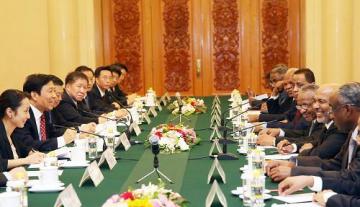China to provide new loans to Sudan: official
March 24, 2014 (KHARTOUM) – The Sudanese ministry of finance of Sudan signed a number of agreements China in the fields of launching new oil exploration efforts, development projects in addition to the approval of additional loans, an official here said today.

They also agreed on working to increase Sudan’s oil production and speed up work on the country’s railway system, he added.
Al-Hussein said that Beijing confirmed its earnest desire to help Sudan overcome its economic obstacles. He praised the role of the Export-Import Bank of China which funds development projects which will begin in the second half of this year.
The Sudanese official also announced that the bank promised to fund oil projects in coordination with the China National Petroleum Company (CNPC) and credit institutions.
Last week the Sudanese finance minister Badr al-Deen Mahmoud and the oil minister Makkawi Mohamed Awad visited Beijing for talks with Chinese officials and executives of major companies and banks.
China has been Sudan’s largest foreign investor particularly in oil and telecommunications after western firms shunned the East African nation due to conflicts and sanctions.
But a report by Reuters last year cited growing difficulties facing Chinese investments as a result of the deteriorating economy.
China’s exports and imports to and from Sudan, which totaled $11.5 billion in 2011, amounted to just $3.3 billion in the January-November period of 2012, Reuters quoted official Chinese data.
The drop in oil trade accounted for much of that decline. But even while the oil industry has been shut down trade has continued to fall. In the first five months of 2013, Chinese exports to Sudan fell 8 percent from a year earlier to $1.7 billion, the data shows.
Sudan has seen its economy take a nosedive after the south became independent in July 2011, taking with it three-quarters of the once united country’s oil output. According to figures from the International Monetary Fund (IMF), the country’s GDP contracted by 4.4% in 2012.
The World Economic Outlook (WEO) released last October by the IMF projected Sudan’s economy to grow by 3.9% in 2013 and 2.5% in 2014.
The Sudanese pound has lost more than half its value, pushing inflation rates to record levels given that the East African nation imports most of its food.
(ST)
